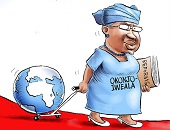Update on the Jab
It’s a truism: bad health of the population, bad economy. What then is happening globally in the Covid-19 pandemic? When will things return to normal? The pandemic continues to rage in various parts of the world, affecting both developed and emerging markets. On July 7, 2021, The Economist, a magazine that has been running stories on vaccines and the Covid-19 pandemic each week, sponsored a webinar featuring an editor and correspondent on the pandemic beat. Natasha Lode, health policy editor at the Economist, highlighted some recent issues. She is also host of the Economist’s podcast The Jab, whose tagline reads, […]
WTO: The Jabs and the Jab-Nots
As the covid-19 vaccines continue to be rolled out across the world, and as trade disputes continue to fester, Ngozi Okonjo-Iweala has her work cut out for her as the new director-general of the World Trade Organisation (WTO). With many years’ experience in politics, economics, and vaccine production, she already has a deep understanding of the issues. On June 29, 2021, she spoke with Zanny Minton Beddoes, editor-in-chief of the magazine the Economist, about ending the covid-19 pandemic and the future of globalization. Ngozi described herself as a “trade outsider” when she first began at the World Bank, “which has […]
Taking Stock
As the covid-19 vaccines continue to be rolled out across the world, how can central banks best counteract the impact of the pandemic? Now might be a good time to pause and reflect on the economic response in Europe. Zanny Minton Beddoes, the editor-in-chief of the magazine the Economist, sat down for an interview with Christine Lagarde, President of the European Central Bank (ECB) on February 10, 2021, to reflect on the challenges Europe faces as it tries to restart its economy while protecting the health of citizens. Lagarde noted the ECB was praised for its quick response in the early […]
Missing the Mark
“In the spring a young man’s fancy lightly turns to thoughts of buying a house,” Morty said, as he put the latest issue of the Financial Analysts Journal on my desk. We don’t often paraphrase Tennyson in the office, so this caught my attention. “You’re not thinking of moving again, are you?” I said. “No, but I always keep my eye on the market,” he said. “You should check out what these economists are saying.” So I did. First I read the FHFA working paper, by the team of Alexander Bogin, William Doerner, and William Larson. “Missing the Mark: Mortgage […]
Barcodes of Finance 4
7. Will blockchain technology affect the drive toward barcodes? It most definitely should—and in a positive way. The maintenance of a distributed database of identifiers, both for participants and products traded throughout the global financial supply chain is the easiest global blockchain infrastructure application to be developed. A global database of all the world’s participant and product identifiers, maybe a half billion records, is limited in scale, both as to data recorded in its distributed ledger and in its limits of processing speed—seconds required, at the most. Both parameters of speed and scale are well within the boundaries of current […]
Barcodes of Finance 3
5. Great, the G20 set up the Financial Stability Board to set things straight. So, what’s the problem? It was thought by all that “regulatory compulsion” at such a global level, overseen by the world’s most prominent collection of leaders of the largest economies, would finally solve the collective action problem that stymied the industry from doing this on their own. Industry members could not justify stepping aside from each firm’s own self-interest in maintaining the status quo. It would be costly to re-engineer legacy systems built in convoluted increments over the previous six decades. Everyone without exception wanted to […]
Barcodes of Finance 2
3. What allowed non-standard transaction date to persist and what was your response? I had spent my whole career in various sectors of finance and as an advisor to many financial institutions as a consulting Partner with PwC, responsible for the Financial Services sector. I saw the same sets of transaction data described differently in each firm, even though they would need to match perfectly between firms in order to confirm the transaction with the counterparty and either receive payment or pay for it. This disorder was managed by delaying the payment until all the details were reconciled, first by […]
Barcodes of Finance 1
After the holidays, Morty was bragging he’d been out to a new, very swanky seafood restaurant. “The maître d’ said they’re planning to bring in seafood barcodes.” I immediately pictured a slab of fish on Styrofoam with the price barcode sticker on it—straight from my local supermarket. “And this is at a high-end place?” I said skeptically. “Yeah, but it’s an identifier code, not a price sticker. It’s so the customer can verify they’re getting what they’re paying for,” he said. “Apparently there’s a big push to identify species, and make the information available.” Talking about fish barcodes reminded me […]
Weatherproofing Bonds
When it comes to managing climate risk, what is the wise investor to do? Low-carbon investing is one possibility. We recently interviewed Marielle de Jong, head of fixed -income quant research at Amundi Asset Management. She said, “The purpose of low-carbon investing is not to penalize companies that produce a lot of CO2. The question is whether the production line is carbon efficient, whether there is no unnecessary spoilage. That is why the selection criterion is the intensity, the tonnage of CO2 per added value, and not the tonnage itself.” She cautioned, “It is a complex task to measure CO2 […]
Weatherproofing Equities
Risks in finance are many and varied. How can a forward-looking researcher choose which areas need the most attention? We recently interviewed Patrick Bolton, professor of business at Columbia University and asked what led to his interest in hedging climate risk. “I am interested in long-term investing, especially how large long-term institutional investors should think about the risk-return trade-offs they face,” he said. “Long-term investors have to think harder about risks that do not yet appear material to short-term investors. One category of such risks is what is now commonly referred to as environmental, social and governance factors, or in […]










